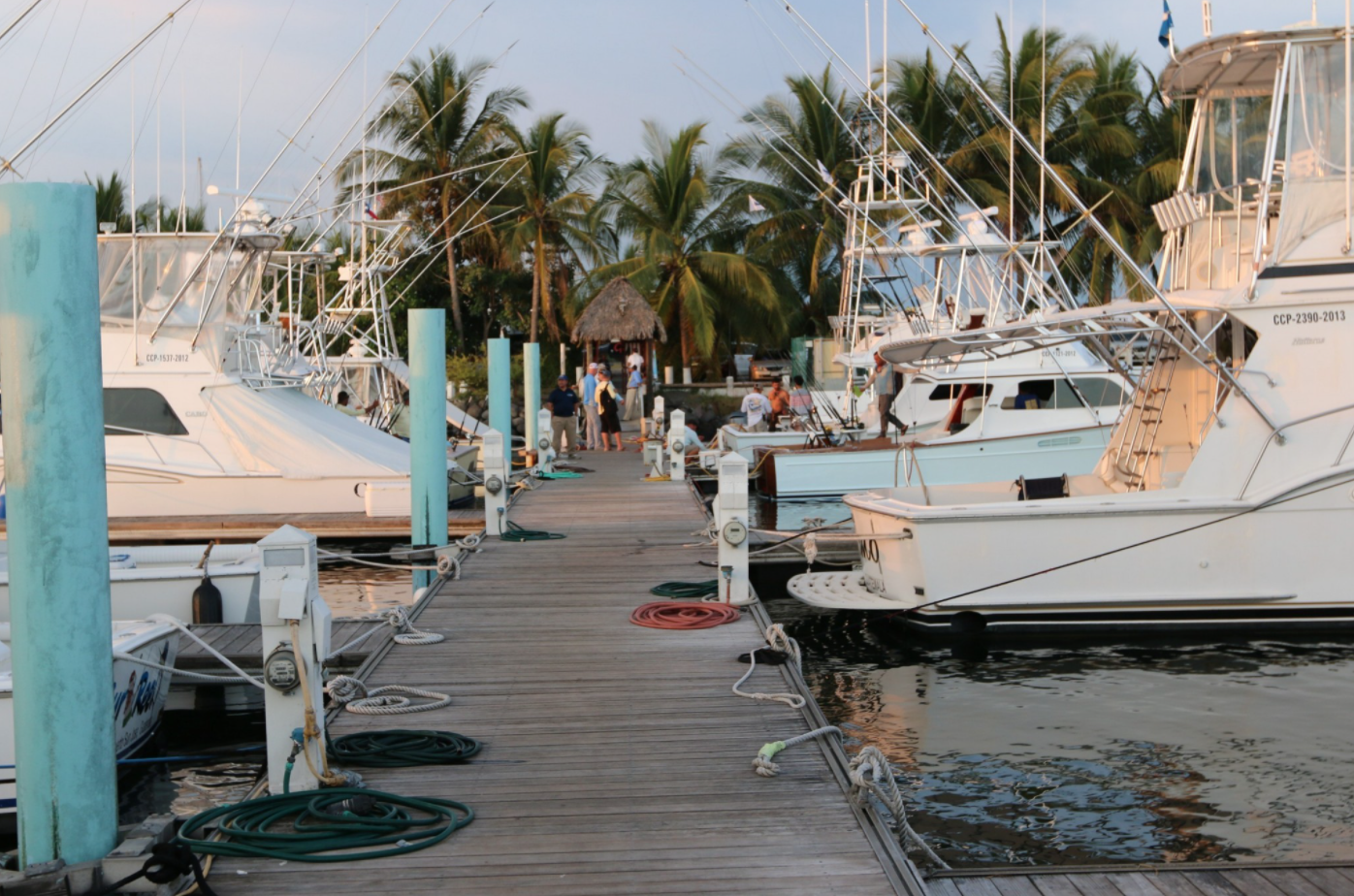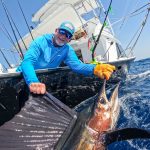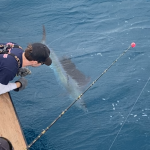Article Courtesy: inthebite.com | Originally Published: 2/4/2021 | Click here for original article
Dock Etiquette: Acting Right Around Boats
By Elliott Stark
“You know, that’s something that’s really, really important. Sometimes, it just doesn’t cross people’s minds,” says Capt. Jimmy Waller of Orange Beach, Alabama. Waller, whose nickname is “PeeWee” runs his 60’ Big Adventure. The topic of fishing etiquette touched off something special for Capt. Jimmy. “We have been cobia fishing, spotted a fish and had people on jet skis pull up to the boat and ask us what we are doing. One time it happened in a tournament. We were working a fish and had a guy and a girl come up to us on a jet ski. They pulled up to us and said, ‘Ahoy!’ You can’t make this stuff up. This will be my 36th year in the charter business. I’ve seen everything from pornos being made in the salon to just about whatever you can imagine.”
While it may sound pretty evident that making a porno on someone else’s boat crosses a line, the topic of fishing etiquette and how to behave on and around boats can be a complicated subject. Those who get it right will enjoy return invitations or repeated freelance stints, those who don’t understand might wind up wade fishing. To determine the expectations of behavior aboard boats, we have surveyed experts from across the sportfishing landscape.
Social Media and Winning with Class
Captains Jeff Shoults and Johnny Dorland have decades of experience tournament fishing in the Gulf. Shoults and his Destin, Florida-based crew on the Mollie won the 2017 Gulf Coast Triple Crown. Dorland is the owner and captain of the Cotton Patch and the director of the Orange Beach Billfish Classic. When asked of the rudest or strangest behavior aboard his boat, Dorland’s two examples were clear. “I had a Tampax put down the toilet once… that wasn’t good. One time we had a guy get completely naked and jump off the tower. We were trolling for marlin 100-miles offshore. He had an inoperable brain tumor…and still does. That was 15-years ago and he’s still not right,” Johnny says.
Shoults has expectations for behavior as well. “Mates are not allowed to post anything on social media. They’re also not to discuss what we do aboard the Mollie with other people. The Mollie is like Las Vegas, what happens aboard stays here,” he says. He also expects a certain manner of behavior on the dock – especially when enjoying tournament success.
“We keep the stereos turned down and act like we’ve won before. Don’t show your ass when you win. It’s like Bear Bryant said when a kid scored a touchdown and jumped all over the place. ‘Do you plan on ever scoring another touchdown? Well, then act like it.’ We also keep the boat looking nice, no matter how much we’ve been fishing. Even if you’ve been fishing hard, the boat shouldn’t show it.”
Dorland shares the social media sentiment. “I once had a mate post everything on social media. When I got back the dock, everybody was telling me how big the fish I caught was and how many ducks I shot. I told him that we don’t put things on Facebook on this boat. He told me that he posted to Facebook on his time, so I told him he could work on his own time too.” Dorland’s approach is pragmatic. “If you don’t act right on the boat, you don’t come back. If you get really drunk, you don’t come back.”
A Lesson in Kentucky Manners
Captain Jen Copeland is a wonderful conversationalist, a great captain and she grew up in Kentucky – folks from Kentucky have a natural understanding of the whole manners thing. Copeland, the former captain of the Three C’s, an Ocean Reef, Florida-based Viking, delivers her perspective charmingly. For fishermen (mates or captains) working on someone else’s boat, Copeland recommends, “If you’re invited to fish on another boat, always leave it in better shape than you found it. And always offer to help clean and shammy the boat. If you know how, you should be helping!”
For angling guests, charters or the boss’ friends, Copeland suggests the following, “Learn to use the head – don’t leave anybody any gifts. Rods off the teak. Remember, when fishing is slow, don’t keep asking when we’re going to catch something. Nobody wants to catch fish more than the crew,” she says. “If you’re a guest, always bring beer.”
“If you’re sick, the rule is ‘Any side but inside!’ Mates don’t care. They’ve all been puked on before. I’d rather you puke in my boot – and I’ve had my boot puked in – than have to clean up after you inside.” Copeland’s ascription of rules comes from unique experience. When asked about the rudest thing she has endured on a boat, Jen didn’t hesitate. “Puking in the sink. His excuse was that he was taking a …. (bowel movement) and got sick. My mate had to go clean it up because the guy was too sick to go back inside.”
“Also, don’t assume that everyone operates with an open checkbook. Let’s not throw away the 15’ fluoro leader with three inches of chafing on the end. Tournament fishing is one thing, but when fun fishing, why not reuse the sailfishing hooks for mutton fishing the next day? And don’t slam the hatches. As my friend Brad Goodrich would say, ‘We have to use that tomorrow.’”
The Importance of Being Respectful: A Mate’s Key to Career Success
InTheBite’s 2016 Gulf Coast Captain of the Year Devin Potts runs the Sea Mixer, a 61-foot Spencer, out of Orange Beach. Devin is blessed with the ability to catch big blue marlin consistently in tournaments and the capacity to state things clearly and directly. “What bothers me is genuine complaining. A captain needs to be a part time psychiatrist to keep a crew together anyway, a mate complaining doesn’t help. We are very upfront with the schedule in our operation. The boss is liable to want to fish at any time—it could be the day after the tournament and he could decide he wants to fish. To me, his desire to want to fish is what keeps us employed. I’ve never had it happen to me, but I really don’t like to hear mates complaining about having to go fishing or saying ‘I don’t get paid enough for this.’ You don’t get paid enough for what? Even if it is warranted, shut up and do your job. That’s the way I look at it,” Potts relays.
Another topper on the list of Devin’s irritating mate behaviors is one that came up many times. “You hire a guy and he says, this is how we did it…” Captain Joey Birbeck on the You Never Know reaffirms this sentiment. “We bring one, two extra mates for tournament season. We have a style of fishing that has been successful. Don’t come on someone else’s boat and tell the mate or the captain how to do their jobs. You have two ears and one mouth for a reason and you’re here to help. I never quit learning, but please don’t try to change our program.”
How does Capt. Jen Copeland feel about unsolicited advice from mates? “If I want your opinion, I’ll give it to you,” she jokes. “The worst thing I experienced from a mate was back talking from the cockpit. If you’ve got something to say, come tell me on the bridge. I can’t have that happen in front of the boss and his family or friends and my regular crew.”
Year in, year out Capt. Patrick Ivie and the Breathe Easy find themselves on the leaderboard across the Gulf circuit. “These days, it’s hard to find somebody that’s proactive and wants to do the job. Not many young guys grew up fishing like we did. I like guys that are eager to learn and excited. Finding someone who is eager to learn is important.” How should a new mate or a mate working on a new boat approach the job? Ivie describes, “You want to be as helpful as possible and ready for any work – from scrubbing toilets to gaffing fish.” Captain Peter B. Wright often advises young mates or those who are just starting on a new job to volunteer for the worst jobs. The crew will take notice and this kind of help goes a long way.
Etiquette While Fishing
Conducting yourself properly while on the water is also an important consideration that sometimes has serious consequences. Devin Potts describes one of the more consequential sides to Alabama cobia fishing. “When it comes to cobia fishing around here, it is serious. Talking about the public pier, if you’re in a boat and you get close to the pier – the bigger the boat, the bigger the target. They will sling giant bank sinkers at you. They have those long spinning rods and will nick the line (so that line breaks when they cast) and rear back and catapult them at you. If one hit you, it would kill you. I always thought Steve-O from Jackass should put on full football pads and run a boat past them…”
The live baiting for blue marlin around the rigs in the Gulf has reinforced a sense of cooperation by the captains who fish them. As Devin Potts puts it, “You’re better off working together than trying to conquer the world by yourself.” Patrick Ivie describes it similarly, with one exception. “If you’re live baiting the rigs, everybody wants to fish their zone – you take your turn and clear out when someone hooks up. I’ve hooked up and had boats not move – especially supply boats. I’ve hailed a supply boat on every channel on the radio asking one to move. I wish they’d read this article.” For a great story about hailing a work boat while hooked up to a blue marlin, check out the “Old Salts Rule” feature.
Boat Guests, Expectations for Charters
Adam LaRosa owns the New Jersey-based Canyon Runner Charters. In 2017, his operation ran 112 canyon trips. It suffices to say that few people have a better perspective on etiquette for would-be charter guests than LaRosa. “The thing that gets me is when a charter gets on the boat and immediately questions the captain. Charter fishing is an odd situation. Generally, in business, the customer is always right—but not when you’re 100-miles offshore at night. Safety is the most important thing and the captain and crew are charged with keeping everyone safe,” LaRosa relates.
“Another thing is mistreating the boat. People sometimes think that because they charter for one day, they can do whatever they want. They don’t understand how expensive things are. A guy asks if he can light up a cigarette on the bridge while we’re running 30-knots. He doesn’t realize that the cushion he’s sitting on costs $5,000.”
To avoid confusion, and preserve his sanity, LaRosa sends out a rules list to all would-be charters. The list is great. Each item it contains has a story that prompted it. It is also a good lesson for most any would-be boat guest. It outlines when the captain will know the weather and be able to predict time of departure, leaving the black soled shoes at home, no liquor or wine offshore, and the restriction on bringing reels that are completely spooled with braid. He also prohibits glass – which can break and cut people and destroy pumps.
Capt. Patrick Ivie appreciates guests who help the crew with little things – especially during double overnighter tournaments in the Gulf. “Cleaning the boat is a team effort. Having guests who will help with cooking and cleaning when we’re fishing all day goes a long way.” Joey Birbeck seconds this. “Your mom doesn’t work here, so nothing goes in the sink.” Guests can also help be vigilant while offshore, “If you see or smell something that is out of place, please tell us.”
Life’s too Short to Be Rude
Generally speaking, people go fishing to have a good time. Being around nice, respectful people really helps this cause. A bit of consideration for the boat, the captain and the crew goes a long way. Don’t puke in the salon and if you’re fishing in Orange Beach, don’t run your boat within a quarter-mile of a pier.






